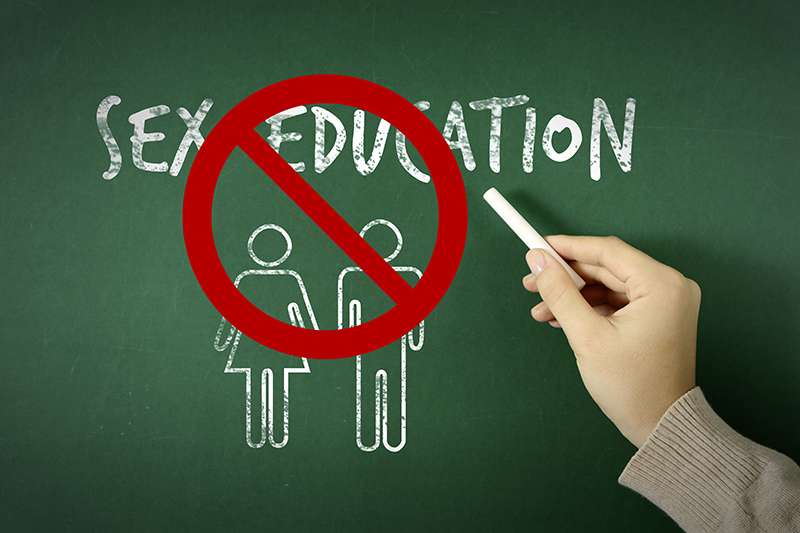Photo: Belchonock, via 123rf
The Florida Department of Education is forbidding its school districts to teach teenagers about contraception, show pictures or diagrams depicting human reproductive anatomy, and discuss issues like sexual consent and domestic violence.
Schools are also disallowed from mentioning the word “fluids” when talking about topics like HIV transmission.
Unsurprisingly, the state’s sex-ed curriculum now bans mentions of gender identity or sexual orientation.
As a result, Orange County Public Schools, which serves Orlando and its suburbs, plans to scrap its high school sex education curriculum.
Those lesson plans — offered initially as an alternative to the state’s approved sex-ed curriculum — had planned to emphasize abstinence as a preferred method of avoiding pregnancy and STDs but also would have included information on how pregnancy occurs, the pros and cons of various birth control methods, what consent means, and ways to handle pressure to become sexually active.
Broward County, which serves the Greater Fort Lauderdale area, has until early October to notify the state with its final plan for sex-ed classes, but says it will comply with state requirements and “emphasize abstinence.”
In September of 2023, the Florida Department of Education, seeking to comply with a law approved by the conservative Republican-controlled legislature, demanded all school districts in the state submit their sex education lesson plans for the upcoming school year in advance.
Previously, each local school board determined how sex education classes were structured within their respective districts.
Under the new plan, each district would have the choice of using state-approved textbooks and lesson plans or formulating their own alternative plans. However, those choosing the latter option would have to submit their plans for approval by education officials.
But as the Orlando Sentinel reported in July, the state did not respond to plans submitted by a number of districts — particularly those from more liberal environs — as alternatives to the state approved curriculum.
As a result, many districts simply canceled sex education classes during the 2023-2024 school year for fear of running afoul of the law, and many of those same districts are now floundering to come up with new curricula or lessons for the 2024-2025 school year, which is already underway.
Under the law, schools are required to teach reproductive health lessons in grades 6 to 12 that emphasize the “benefits of sexual abstinence as the expected standard and the consequences of teenage pregnancy.”
Previously, districts were given the option of providing additional instruction. For example, in Orange County Public Schools, students were introduced to reproduction with a class focusing on the physical changes of puberty, and high schools offered additional instruction broaching the topics of contraception and STDs.
However, at a time when conservative parents are railing about parental rights and objecting to even the most benign, scientifically-based information relating to sexual education, many districts now find themselves mired in a Catch-22, trying to balance students’ right to know with parents’ desire to keep certain topics out of classrooms.
In response to Broward County’s proposed sex-ed curriculum, Florida DOE officials called the district to inform them of “concerns” about the content of its sex-ed classes, according to a memo recounting the call.
The memo outlines a host of topics that teachers are forbidden from including in sex education classes.
“Pictures of external sexual/reproductive anatomy should not be included in any grade level,” it reads. “Contraceptives are not part of any health or science standard” but could be mentioned as a “health resource.” However, any “pictures, activities, or demonstrations” that detail or illustrate how to use contraceptive methods “should not be included in instruction in any grade level.”
Moreover, “different types of sex (i.e., anal, oral, and vaginal) cannot be part of instruction in any grade level.”
Orange County School Board member Karen Castor Dentel noted that the restrictions on sexual education are likely to drive students underground, prompting them to use their mobile phones to access a host of potentially problematic, unreliable, and even inaccurate information from questionable online sources.
“I think it’s utterly ridiculous and is a continuation with the state’s obsession with sex and denying our students fact-based information about their bodies, how they work,” Castor Dentel said. “I think it’s a disservice to this generation.”
She also pointed out that sex education classes have always been voluntary, with an option for more conservative parents to opt out of such lessons.
Elissa Barr, of the Florida Healthy Youth Alliance, a group advocating for comprehensive sex education in schools, told the Sentinel she has heard from health educators in dozens of districts who have been instructed to remove topics like contraception or STD transmission from their sex ed lesson plans in favor of an abstinence.
Barr has been keeping a list of words and phrases that teachers have been told to excise from sex-ed curricula. The list includes “abuse,” “consent,” “domestic violence,” “fluids,” and “gender identity.”
She told the Sentinel that disallowing the word “fluids” makes it harder to accurately teach how HIV is transmitted — something required by the state — since the virus is spread through blood, breast milk, semen, and vaginal fluids.
Barr argued that decades of research shows that an “abstinence-only” approach has been ineffective at preventing STDs or unplanned pregnancies, whereas approaches that highlight abstinence as a valid choice while providing more comprehensive information about contraception and safe sex have generally proven more effective.
A state-authorized textbook used in high school classes in Florida’s Lake County last year takes an abstinence-only approach to preventing STDs and pregnancy. It does not mention contraception.
That textbook also encourages students to go on group dates rather than spend one-on-one time with a partner, lest they be tempted to become sexually active.







